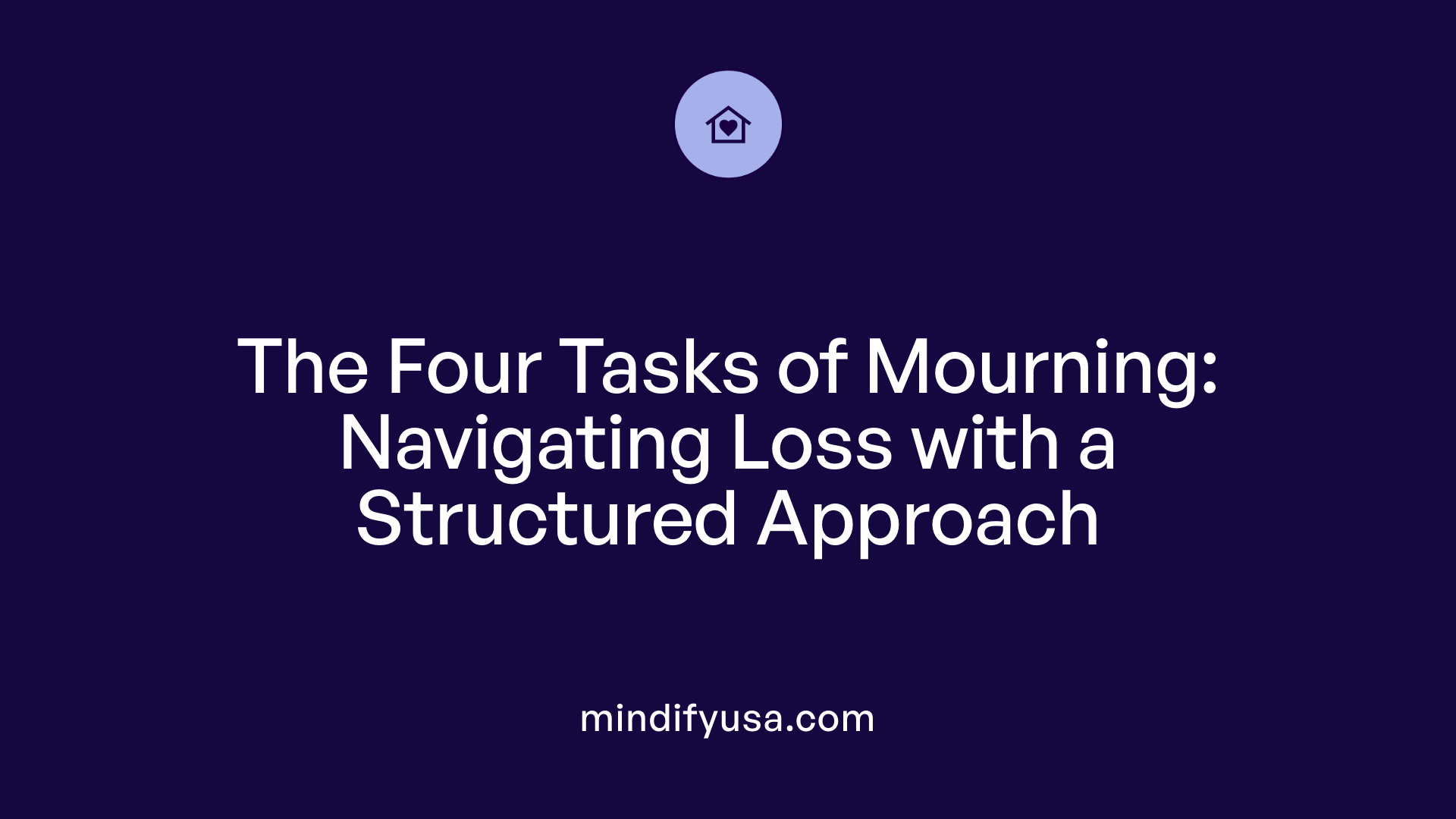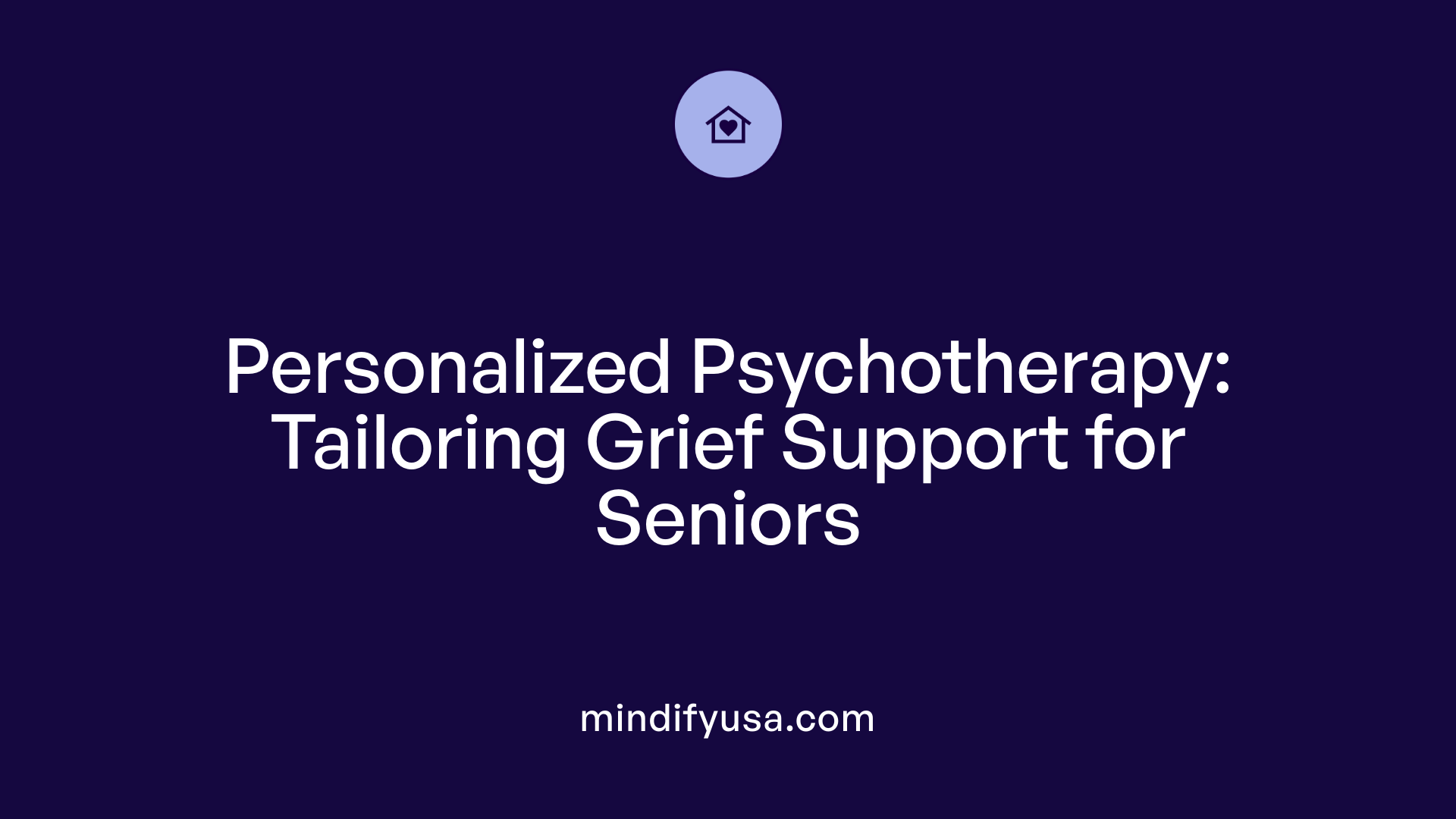Understanding and Addressing Grief in Senior Populations
Grief in seniors manifests through complex emotional, physical, and social reactions. As individuals age, their responses to loss can become more intricate due to accumulated life experiences, health considerations, and social circumstances. This article explores the primary psychotherapeutic approaches designed to support seniors in navigating their grief, emphasizing evidence-based practices, therapeutic techniques, and support strategies tailored specifically for older adults.
Foundations of Grief Counseling in Elderly Populations

Purpose and goals of grief counseling in seniors
Grief counseling for older adults aims to support them in understanding and managing their emotional reactions to loss. The primary goal is to help seniors adapt to life without their loved ones and to facilitate a process of healing. It provides a safe space where they can explore complex feelings such as sadness, anger, guilt, and loneliness. Through this support, seniors are guided toward restoring emotional balance, rebuilding their lives, and finding new ways to derive meaning from their experiences.
The four tasks of mourning as a framework
Grief counseling often uses the four tasks of mourning as a guiding framework to help seniors navigate their loss. These tasks include:
- Accepting the reality of the loss: Acknowledging that the loved one is gone.
- Processing the pain of grief: Allowing feelings of sadness and distress to be expressed.
- Adjusting to a world without the deceased: Developing new routines and roles.
- Finding an enduring connection while embarking on a new life: Maintaining bonds through memories, while fostering personal growth.
This structured approach helps individuals move through grief stages, encouraging healthy adaptation and emotional resilience.
How do grief and emotional responses typically manifest in older adults?
In seniors, grief manifests through both emotional and physical responses. Emotionally, older adults often experience intense feelings such as shock, disbelief, sadness, anger, guilt, and anxiety. Physically, symptoms may include fatigue, sleep disturbances, appetite changes, gastrointestinal issues, and even somatic pain. The grieving process tends to be non-linear; individuals may oscillate between distress, numbness, and yearning, with different rates of progress.
Prolonged grief can develop, characterized by persistent distress, preoccupation with the deceased, and impairments in daily functioning. Factors influencing how grief appears include social support levels, cultural traditions, the closeness of the relationship, and personality traits. Recognizing these patterns helps therapists formulate appropriate, tailored interventions.
What are the common psychotherapy approaches and techniques used to treat grief in seniors?
Psychotherapeutic methods for older adults include grief counseling, cognitive-behavioral therapy (CBT), and specialized therapies like Complicated Grief Therapy (CGT) and Meaning-Centered Grief Therapy (MCGT). These approaches focus on helping seniors process emotions, challenge maladaptive thoughts, and find personal meaning in their grief.
Techniques employed in therapy vary but commonly involve active listening, empathy, and the use of metaphors, symbols, and imagery exercises. For example, drawing or letter-writing may be used to facilitate emotional expression. Role-play, memory work, and narrative techniques help clients explore their grief stories.
Structured therapies like CGT often combine psychoeducation with exposure exercises, helping the individual confront painful memories and reduce suffering. Support groups or community-based programs are often integrated to reinforce social connection, which is vital for healing.
What therapeutic methods do mental health professionals use to assist seniors coping with grief?
Mental health providers rely on Evidence-Based Practices such as CBT, CGT, and Interpersonal Psychotherapy to assist seniors. These therapies address emotional processing, cognitive restructuring, and meaning-making.
Role play, imagery, and reminiscence are common techniques that foster emotional engagement and insight. For instance, clients might imagine conversations with loved ones or create visual memory collages.
Group settings and peer support also play significant roles, providing social reinforcement and shared understanding. Additionally, some programs incorporate Life Review Therapy to help seniors process their life's story and integrate loss within a coherent narrative.
While medication, like SSRIs, may be considered for co-occurring depression, psychotherapy remains the foundation for grief treatment. It helps seniors work through their feelings, improve coping strategies, and rekindle a sense of purpose.
What support strategies and interventions are effective for seniors coping with grief?
Support strategies for grieving seniors include individual counseling, family involvement, and participation in support groups. These options foster emotional expression, normalize grief experiences, and combat social isolation.
Engaging in activities such as art, music, or physical exercise enhances emotional well-being. Mindfulness and relaxation practices like meditation and yoga can also reduce anxiety and improve mood.
Community resources, including faith-based groups or social clubs, provide additional avenues of support. Nurse practitioners and social workers play key roles in monitoring physical and emotional health, guiding seniors toward appropriate therapies.
When grief persists beyond a couple of months, professional evaluation is necessary to guide further intervention, especially if symptoms indicate complicated grief or depression.
What are the evidence-based treatments and clinical practices for managing grief in older populations?
Evidence-based treatment options include tailored psychotherapies like CGT, which has demonstrated effectiveness in reducing symptoms of prolonged grief.
CBT, with techniques like exposure and cognitive restructuring, helps individuals process their loss and challenge maladaptive thoughts. MCGT emphasizes meaning-making and emotional expression.
Screening tools such as the Inventory of Complicated Grief-Revised (ICG-R) facilitate early identification of those at risk for persistent grief issues.
Clinicians also prioritize social support and psychoeducation, recognizing the importance of addressing existential concerns, physical health issues, and social isolation.
How can healthcare providers recognize and treat complicated or prolonged grief in seniors?
Healthcare providers should monitor for ongoing, intense grief reactions lasting beyond 12 months, including persistent yearning, emotional numbness, and inability to function effectively.
Differentiating CG from depression is crucial, which entails assessing loss-specific symptoms versus clinical depression.
Evidence supports the use of CGT as a specialized psychotherapy that has shown high response rates.
Treatment involves exploring grief reactions in depth, processing emotional pain, and fostering new coping skills. When depression co-occurs, pharmacotherapy alongside psychotherapy can be considered.
Proactive screening and individualized care plans are essential in managing complex grief, ensuring timely and appropriate interventions for older clients.
Tailoring Grief Interventions to Individual Needs in Seniors

What are the best practices for tailoring psychotherapy for grief in seniors?
Effective grief therapy for seniors requires personalized approaches that account for their unique circumstances. One of the fundamental principles is considering the individual's cultural background, personality, physical health, and social support systems. Recognizing these factors helps tailor interventions that resonate more deeply with the person’s experiences and preferences.
Timing plays a crucial role. Some seniors may benefit from early intervention soon after loss to prevent prolonged distress, while others might need time to process their emotions before engaging in therapy. The environment where therapy is conducted also matters; it should be comfortable, safe, and accessible—whether in clinics, community centers, or even at home.
Integrating elders' life histories through techniques like life review or narrative therapy can make sessions more meaningful, helping seniors reconnect with positive memories and find new significance in their experiences. Regular monitoring of progress is essential to adjust techniques as needed, ensuring the approach remains aligned with the individual’s evolving emotional state.
Engaging family members or close friends, when appropriate, can enhance the therapeutic process. Their involvement can provide additional emotional support and facilitate understanding, creating a more robust support network for the senior.
What role does cultural background play in grief therapy for seniors?
Cultural background significantly influences how seniors express grief, cope with loss, and respond to therapy. Different cultures have specific mourning rituals, remembrance practices, and emotional expression norms. For example, some cultures may emphasize community involvement or spiritual ceremonies as integral parts of mourning.
A culturally sensitive approach involves respecting and incorporating these practices into therapy. This approach fosters trust and encourages active participation. For instance, if a culture values collective grieving, involving family and community in the process can be highly effective.
Understanding cultural norms also helps avoid misunderstandings or resistance. It allows therapists to choose intervention strategies that align with cultural values, such as spiritual counseling or culturally relevant expressions of mourning. Tailoring interventions in this way enhances their relevance and helps facilitate a more profound healing process.
In summary, recognizing and respecting cultural backgrounds in grief therapy for seniors ensures that support is both meaningful and effective, fostering a respectful and empathetic environment for healing.
| Aspect | Consideration | Implementation Example |
|---|---|---|
| Cultural Norms | Respect mourning rituals and traditions | Incorporate prayer or spiritual ceremonies |
| Expression of Grief | Adapt to preferred emotional expression | Use storytelling or art if culturally relevant |
| Community Involvement | Engage family and community support | Include community leaders or spiritual guides |
| Therapist Approach | Use culturally appropriate language and practices | Avoid assumptions; ask about preferences |
These targeted strategies support effective grief counseling tailored to each senior's cultural context, promoting healthier mourning and adjustment.
Supporting the Path to Healing: A Holistic Approach
Addressing grief in seniors requires a nuanced, compassionate, and evidence-based approach. Therapeutic strategies should be individualized, culturally sensitive, and adaptable to the evolving needs of each person. Combining psychotherapeutic techniques such as grief counseling, cognitive restructuring, and meaning-making with support networks and community resources can significantly enhance emotional well-being. Recognizing signs of complicated or prolonged grief is essential for early intervention, helping prevent long-term mental health issues. As seniors navigate the complex journey of mourning, mental health professionals play a vital role in guiding them towards acceptance, resilience, and a renewed sense of purpose, ultimately fostering a compassionate environment where healing can flourish.
References
- 10 Grief Counseling Therapy Techniques & Interventions
- Complicated grief - Diagnosis and treatment
- Grief, Loss, and Bereavement Fact Sheet #5: Evidence-Based ...
- Grief Counseling: Support Strategies for Seniors Coping ...
- Coping with Loss: Bereavement Support for Seniors
- Living with loss: Evidence-based strategies with older ...
- 10 Grief Counseling Therapy Techniques & Interventions
- Review of Grief Therapies for Older Adults - PMC
- Coping with Loss: Bereavement Support for Seniors





































































































